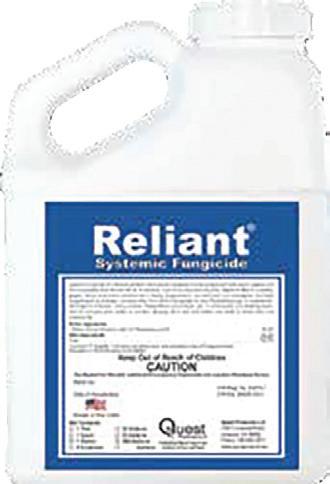
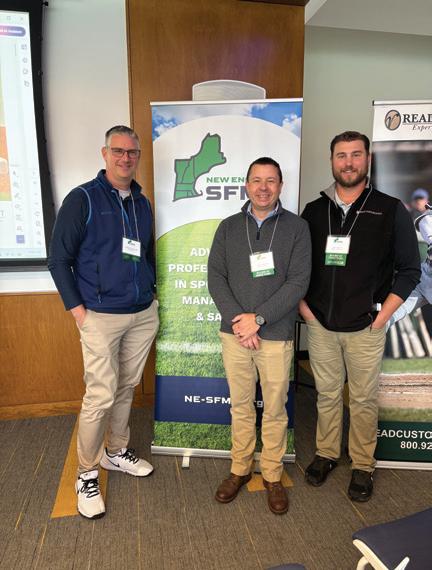
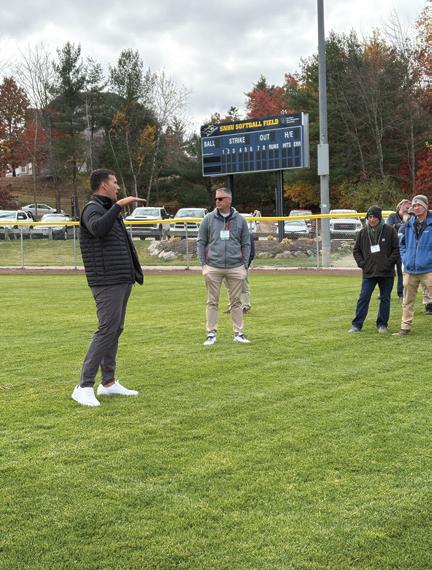
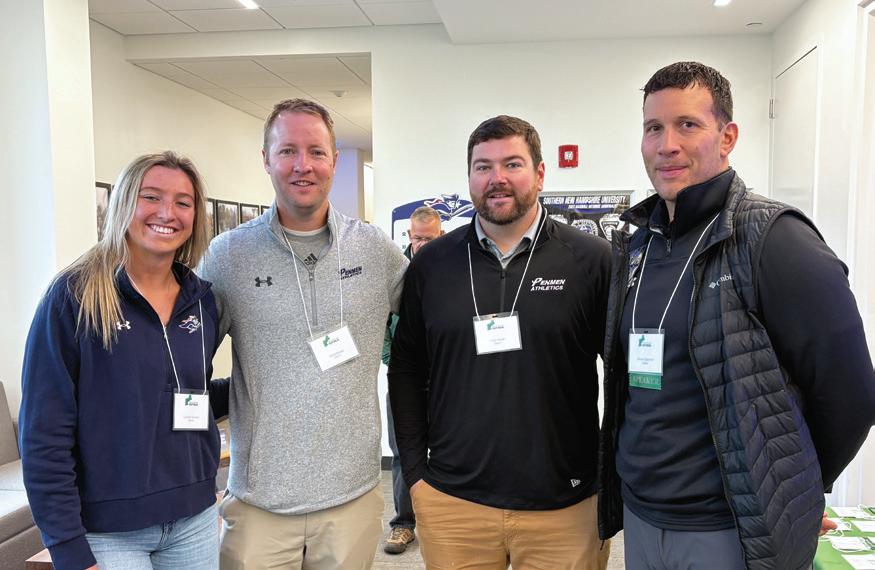







early 100 sports field professionals gathered at Southern New Hampshire University on October 29 for an engaging and informative seminar led by Jonathan Charwick, RLA, of Activitas, and James Gassman, Associate Athletic Director at SNHU. Together, they shared insights into how they navigated every phase of a major athletic field upgrade—using SNHU’s recent softball field renovation as a real-world case study.
• Real-World Perspective: The SNHU grounds crew faces many of the same challenges as other sports field professionals including limited budgets, smaller staffs, and high expectations, yet still delivers top-quality natural and synthetic fields.
• Collaborative Leadership: Emphasizing teamwork in decisions from equipment purchases to daily operations builds morale and boosts productivity across the crew.
• Cross-Department Collaboration: Early involvement of multiple departments in facility and field design ensures that projects meet all users’ needs and are easier to maintain long-term.
• Attention to Detail in Contract Work: Following up with contractors during and after installations (e.g. such as irrigation systems) prevents costly issues down the line.
• Strategic Resource Management: Smart use of subcontractors for routine maintenance frees staff to focus on higher-priority tasks and planning.
• Budget-Conscious Planning: When full renovations aren’t feasible, prioritize the most pressing needs and phase future improvements to maximize long-term impact.
• Networking Value: Connecting with peers in the industry provides invaluable support, fresh ideas, and practical solutions for shared challenges.
Special thanks to Adam Ferrucci and the NE-SFMA Education Committee for organizing this valuable seminar. Our gratitude also goes to Jonathan Charwick, James Gassman, and the entire SNHU team for generously sharing their experiences and expertise. We extend appreciation to our lead sponsors, TPC and Read Custom Soils, and to our supporting partners—Heritage Professional Products Group, PJC Organic, and Target Specialty Products—for helping make this event possible. •
Framingham, Massachusetts
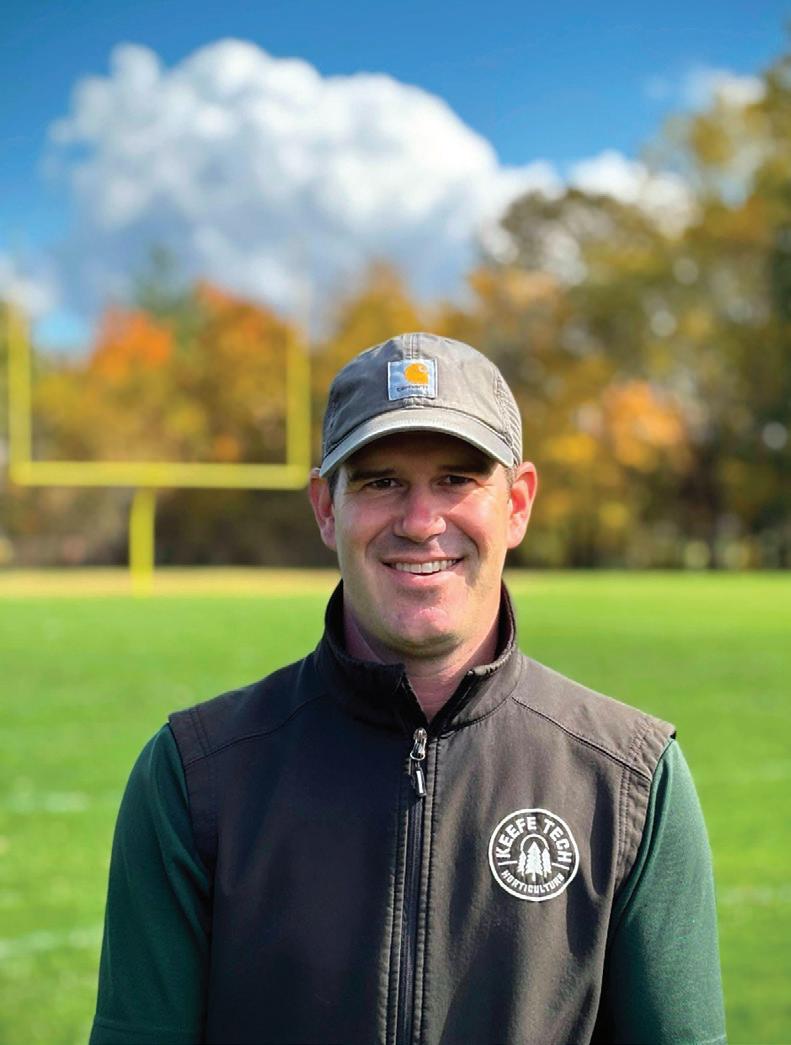
How did you get your start in the sports field industry?
In high school I worked at a golf course which sparked an interest in turfgrass management. I went on to pursue a career in the golf industry with aspirations of becoming a golf course superintendent.
Where did you go from there?
I had the opportunity to teach Turf 101 at North Shore Community College at night for a few semesters and found that I really enjoyed teaching. A few years later I jumped on a full-time opportunity to teach at the high school level. I currently teach landscape construction and maintenance, as well as turfgrass management to grades 11 & 12 in the horticulture program.
Who was your mentor when you were first starting out in the industry, and why?
Jack Ryan, golf course mechanic, taught me a lot about equipment maintenance, but more so about work-life balance and the importance of finding a career that is fulfilling. I probably wouldn’t still be teaching without the guidance, encouragement, and support of my fellow teacher Doug Paul. Lastly, Andrew Carlisle has been a great support and help whenever I have sports field questions or need guidance.
What’s the best business advice you’ve ever received?
“It’s just money, you’ll make more tomorrow.” - Jack Ryan
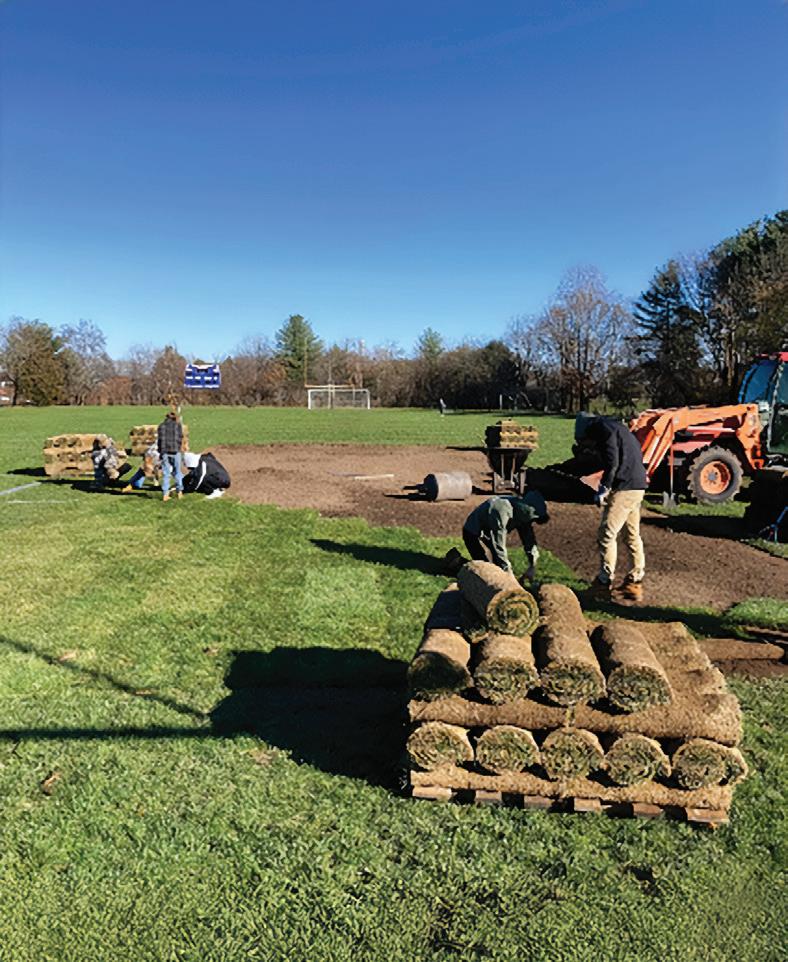
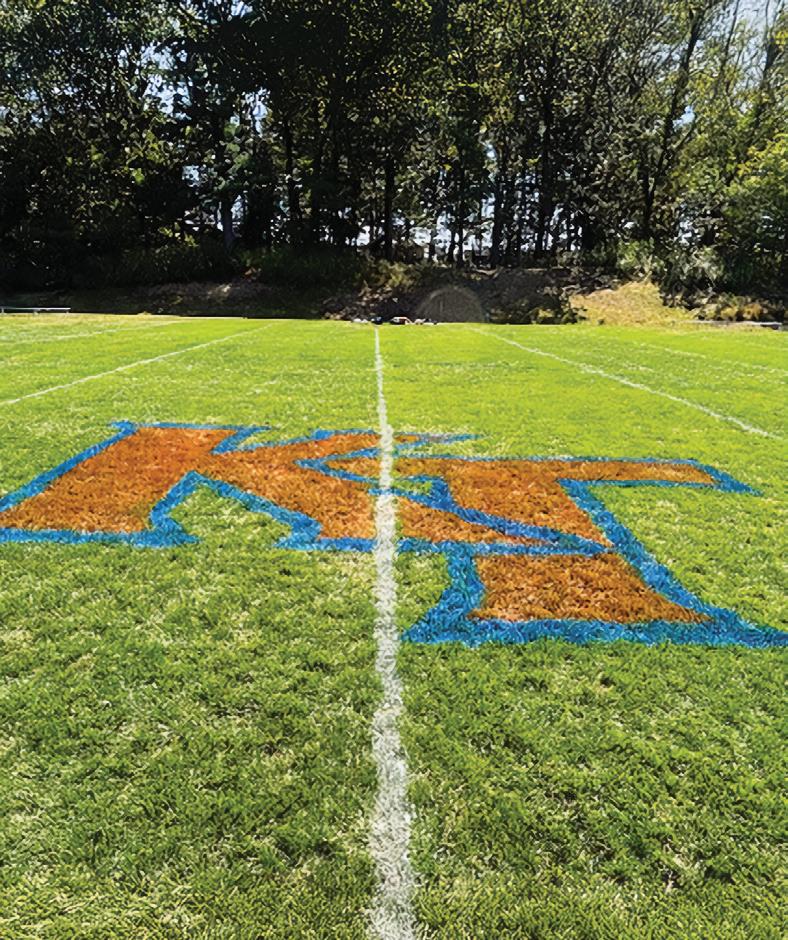

What is the next “game-changer” you see on the horizon for sports field management?
Young, skilled employees! Horticulture programs all over the state are working hard to instill a passion and equip students with the skills needed to fill roles in the industry.
What advice would you share with people starting out in sports field management today?
Find purpose and fulfillment in what you do: whether it’s providing safe playing surfaces to athletes, training employees for success, or creating a positive work environment. Leaving work feeling fulfilled balances the stress and demands of a career in turf management.
Can you share a bit about your family life and / or what you enjoy doing in your free time?
The greatest benefit to being a teacher is the time it allows me to spend with my family. My wife, Lisa, also works in a high school as a school psychologist so our schedules as a family are aligned - a huge advantage as our children, third-grader Lily and kindergartener Mason, start to fill our evenings and weekends with games, practices, and activities. During the summers we spend a fair amount of time on the road camping and enjoying time together as a family.
Is there anything else you’d like to share with your fellow NE-SFMA members?
We currently live in a world of instant gratification. Teenagers and young adults sometimes lack long-term goals and an understanding of the planning, time, and hard work it takes to reach them. Take the time to connect with them and share your story of how you reached the role you’re in. Tell them how little money you made when you started, how hard you worked, the sacrifices you made, and how these experiences were necessary in securing a fulfilling career. Perspective goes a long way in connecting and motivating the next generation.
What have you enjoyed most / find most beneficial about being a NE-SFMA member?
The resources and network have been very valuable to me as I continue to learn, teach, and implement sports field management practices. •
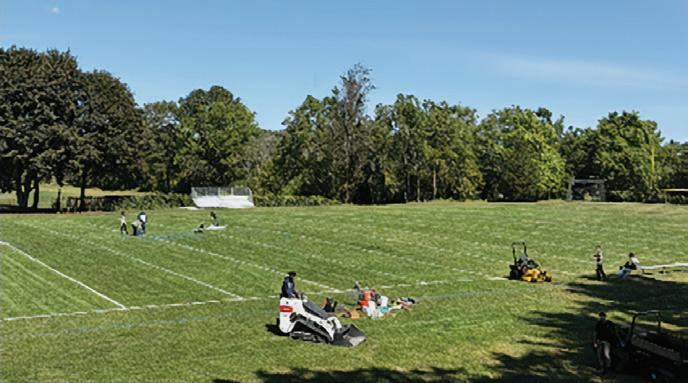
By Scott Vose
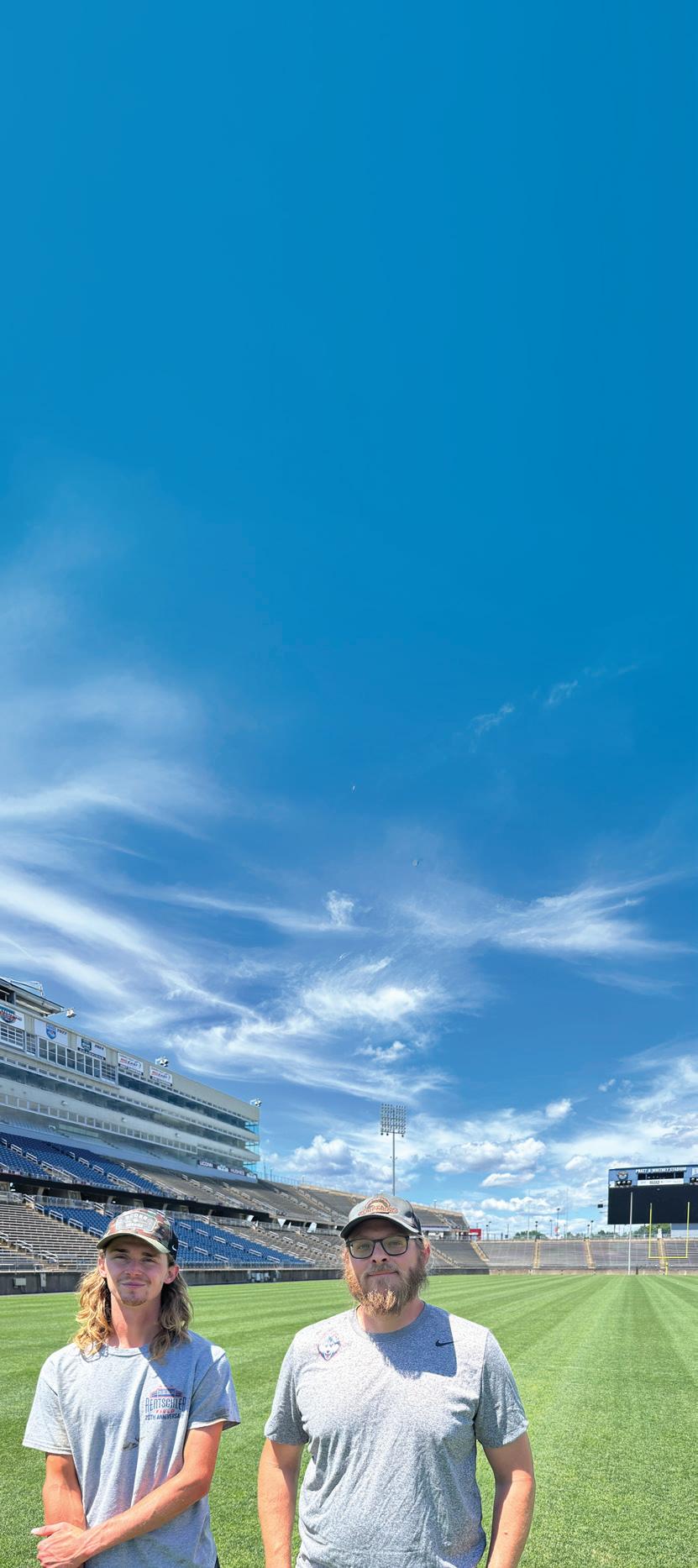
Rentschler Field at Pratt and Whitney Stadium in East Hartford, Connecticut is the largest natural grass venue in New England. Opened at the end of August 2003, with a capacity of more than 40,000, initially hosted games for the Hartford Colonials of the UFL. The stadium hosted NCAA LAX Championships for all divisions in 2019, 2021 and 2022. The “Rent” is now the home of UCONN Huskies Football, hosting all their home games. In 2025, in addition to NCAA Football the field will also host the Connecticut High School Football State Championships, a US Women’s Soccer Match, and the largest concert at the stadium to date.
NE-SFMA is excited for the opportunity to hold our Sports Field Forum in the Fall of 2026 at Pratt and Whitney Stadium and Rentschler Field. James Lappetito, Field Superintendent and his Assistant Ben Morrow invited me to the field to provide a bit of a preview into their daily lives as turf managers in a stadium setting as they prepare for a busy fall. After holding the first two UCONN Football practices in mid-August, the field will host a high energy Chris Brown concert expected to draw nearly 30,000 patrons. The following Saturday, the field will host its first UCONN Football home game.
Planning and preparation are James’ foundation for success. He welcomes input from his staff and encourages open-minded problem-solving solutions, “Working together to create a plan leads to less time talking as the plan is carried out,” said James. He feels strongly this helps empower his staff and builds confidence when making decisions for themselves. Utilizing the Tom Irwin Planner with Client Representative Chris Kneale, James can plan out the monthly goals for his entire year. This allows him and his staff to focus on the task at hand on a day-to-day basis, allowing more time to be detail oriented and make clearer observations. This model of work ethic can more quickly identify if something is off with the health or performance of the field.
The faster you can address a potential issue, the more likely you are to overcome it. Data collection is very important for James to verify his maintenance program is yielding the results he desires, “It is essential to have numbers to back up maintenance practices” he said. From performance testing data to real time readings from his SGL portable weather station/soil monitoring units, James is constantly monitoring field conditions to create the most consistent playing surface. With the unpredictable weather in the Northeast, he understands often the best plan is having a Plan B, C and D. Most times these strategies may not be utilized but having them in place allows him and his team to feel more relaxed on event days, all the hard work was planned for and carried out in advance.
NE-SFMA’s Education Committee is looking forward to providing its members with an insiders’ look at the maintenance operation of Rentschler Field on October 7, 2026. •
Editor’s Note: This interview was conducted in July 2025.



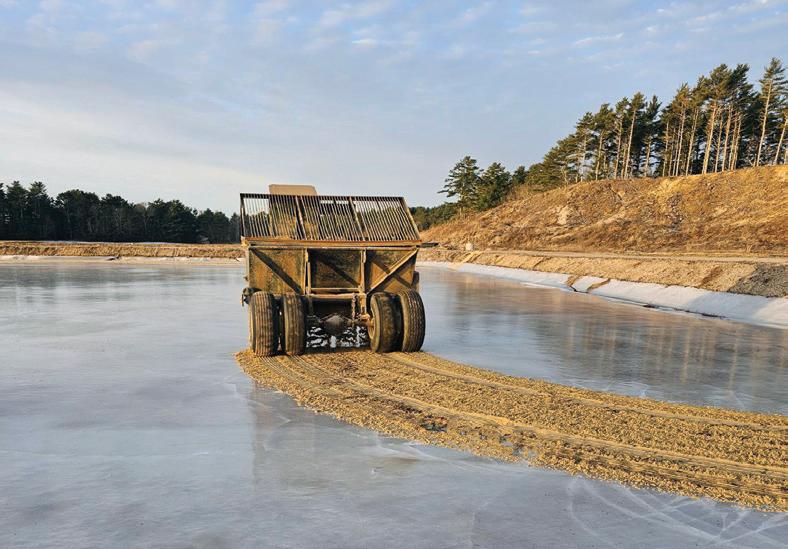
For the past 10 years, ADM has engaged in an aggressive bog renovation program, updating older, lower-producing bog systems with newer varieties that allow for higher yields. Sand plays a crucial role in the renovation process, helping to rebuild the bog layers, improve soil structure, and promote healthy root development. The practice of renovating is critical for sustainability, not only economically but environmentally, as it enables more efficient water management.
So what’s the dish on the saucy stuff?
Legend has it that the pilgrims’ first Thanksgiving in neighboring Plymouth featured some sort of cranberry side. In reality,
the berry’s association with holiday meals began with General Ulysses S. Grant, who ordered cranberry sauce to be served to military troops on Thanksgiving in 1864.
Through the 1940s and 1950s, Ocean Spray sought to position canned cranberry sauce as a perfect accompaniment to chicken – it is – and tried to create a new tradition of roast chicken and cranberry sauce to be served on Fathers’ Day.
While that idea didn’t take, no Thanksgiving dinner would be considered complete without a serving of cranberries, either complete with rings right out of the can, or a homemade relish made with boiling fresh cranberries with water and sugar, orange juice, or any number of other additives. The ADM website offers a variety of cranberry sauce recipes. •
Learn more about the cranberry industry by visiting the Cape Cod Cranberry Growers’ Association www.cranberries.org
RCS is New England’s leading provider of lightweight planting soil for green roof installations, stabilized stonedust for nature paths and pedestrian walkways, bioretention/raingarden soils, a proprietary blend ideally suited for challenging urban tree planting, and specialized soils for athletic fields. RCS operates from a state-of-the-art blending facility in Carver, MA, a second blending facility in Acton, MA, and a quarry in New Hampshire.
A.D. Makepeace Company khoudlette@admakepeace.com • 508.273.6034







